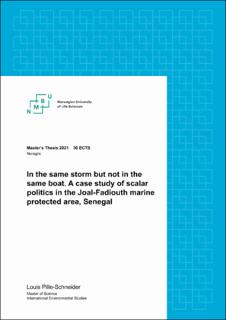| dc.description.abstract | Marine protected areas (MPAs) constitute today the favored tool for fisheries management and marine and coastal conservation around the globe. In practice, the establishment of MPAs is however not free from impacts on the coastal communities that rely on the ocean and its resources for their livelihoods and wellbeing. This is particularly so in developing countries, where communities living at sites where MPAs are increasingly being established tend to have low incomes that render them vulnerable to imposed constraints on their rights to access and exploit the resources they depend on.
Senegal strongly relies on fisheries for its national economy, food security, and cultural continuity. However, overexploitation and the long-warned decline of fish stocks, and the longlived competition and contention over marine space and resources between the artisanal and industrial subsectors has since the 1990s led Senegalese artisanal fisheries into a socialecological crisis. With the aim of curbing this crisis, MPAs have since the mid-2000s constituted, the favored strategy for managing fisheries.
Employing a political ecology lens this study was conducted with the twofold objective to, first, examine the local implementation of the Joal-Fadiouth MPA as a fisheries management intervention and its consequences for artisanal fishers, and second, to situate this intervention within the broader political economic seascape, with the aim to unveiling why the local scale, inherent to the Joal-Fadiouth MPA, remains the one favored for addressing overfishing and marine resource degradation in Senegalese waters.
Adopting a case study design and qualitative research methods, this research was conducted through semi-structured interviews among the fisherfolk community of Joal-Fadiouth, as well as with multiple representatives from local and national institutions, and through photovoice focus groups with fishers.
I have found the JFMPA to constitute an expression of scalar politics, whereby the local scale is the one being operationalized for fisheries management and addressing overfishing and the degradation of marine resources in Senegalese, as a means to allow the State for accumulating from both conservation and extractive zones concurrently, at the expanse of artisanal fishers. | en_US |

